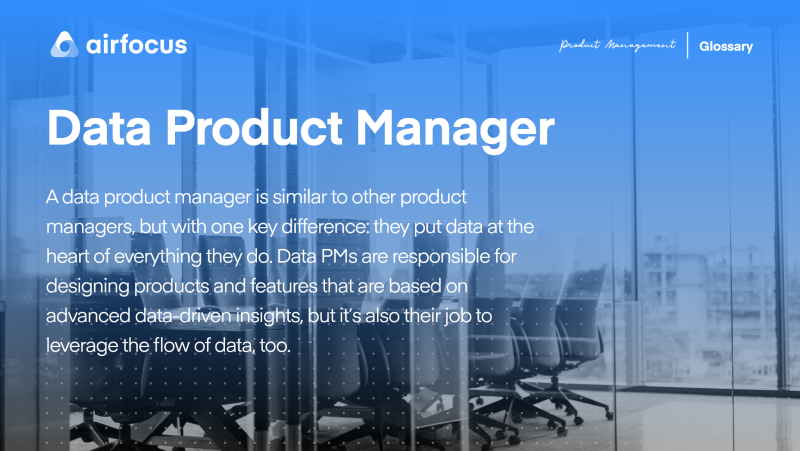Data Product Manager
What is a data product manager?
Definition of a data product manager
A data product manager is similar to other product managers, but with one key difference: they put data at the heart of everything they do. Data PMs are responsible for designing products and features that are based on advanced data-driven insights, but it’s also their job to leverage the flow of data, too.
Using data to inform product design is nothing new. In fact, one of the earliest stages of product development is customer research — the results of which help shape a product. For the conventional product manager role, this is where the leverage of data ends — it’s essentially a means to an end. For a data product manager, however, data is leveraged throughout the development process (and even beyond).
As the world has become ever more data-driven, the collection of customer insights has likewise become more common. It’s the role of the data PM to find a way to tap into these data streams within product features.
They’re no longer tools used to build a feature, but rather are deeply integrated into the features themselves.
How does a data product manager use data?
Because they are responsible for collating and interpreting all product data, data product managers have to act as both data analysts and product managers. They use data to perfect the product process and make proactive decisions.
They use data to define goals that align with the company's overall mission. Everything from long to short-term goals falls under their remit, and they are expected to use their expertise to make and contribute towards decisions on anything, from product features to key metrics used to track success.
As they define and track these key metrics, they are also expected to distill large amounts of data into understandable, actionable steps for the entire company. This might also involve allocating resources and project management as you interpret and share these metrics.
Examples of how data product managers use data
Becoming a data product manager is often an end goal for someone who has studied data science. It’s the perfect balance of working in and with data, managing a team, and strategic thinking. Here are just a few tasks that a data product manager can expect to do regularly.
Conduct market, competitor, and customer research: This can involve everything from an initial SWOT analysis of the market to user and beta testing of the product before launching.
Create data-based customer personas: While the marketing department often develops buyer personas, it’s important to collaborate with them and include metrics and key data to back up your reasonings.
Perform A/B testing to determine what works best: This includes both internal and external testing. While testing in-house is a great first step, you won’t be able to fully determine how good the product is until you try it with potential customers.
Use data and analysis to support and influence stakeholders: Every decision made should be backed up with data. However, this can also mean breaking down and simplifying said data for anyone to understand. This is a large part of a data product manager’s job, so being able to explain this data to ‘regular’ people is critical.
Set OKRs and KPIs: Data product managers set OKRs, KPIs, and SMART goals for their team and department and the entire company.
Metrics that data product managers track
While you can make data on just about anything, companies often get bogged down analyzing metrics instead of implementing what the results tell them. Here are just a few key metrics that a data product manager should regularly track.
Monthly and daily active users: These figures should increase as you move through the product life cycle, but it can depend on the product. Set a target of how often a user should use the product (it can vary from multiple times a day to once a month) and determine what action quantifies an active user.
Customer conversion rate: A high conversion rate means customers come to your website/storefront and purchase.
Customer churn and retention rate: All businesses want repeat customers but churn and retention can depend on the product you’re stelling (you wouldn’t expect Christmas tree businesses to have high retention rates). Tracking this metric helps you determine why customers are returning to buy again — or why they’re not.
Net promoter score and customer satisfaction score: Net promoter score (NPS) covers the entire customer journey and looks at qualitative data. Customer satisfaction score (CSAT) is a quick rating of a specific area, such as onboarding or accessibility.
Customer acquisition cost: This metric helps you work out how much it costs to get each customer. This usually entails dividing a marketing budget with the customers gained from that marketing promotion. However, it doesn’t consider the amount each customer spends.
Monthly and annual recurring revenue: Your accounting team should be all over this one, but it helps to keep an eye on it yourself. Recurring revenue is your constant stream of income, such as subscription models. Higher customer retention rates equate to higher recurring income, so be sure to look at these two metrics together.
What is the difference between a product manager and a data product manager?
While there are naturally several similarities between product managers and data product managers, it’s really the understanding of — and connection to — data that sets them apart.
Historically, a product manager will work with a data analyst to source data with which to make decisions — customer behavioral data, for example — and that’s where the relationship ends. A data PM, on the other hand, must be able to marry these two roles up in a meaningful way, taking on the strategic role of the data analyst and the more practically focused responsibility of the product manager.
In terms of core responsibilities, both roles will share almost everything.
For an average PM, that includes backlog refinement, presenting new releases, customer development, and working with other areas of the business. A data PM does all of this, but is also responsible for developing ways to leverage real-time data as part of a product’s core feature set.
Here’s a practical example.
A product manager could develop a feature that references a database of historical customer GPS movements in order to make location-based suggestions. A data product manager may choose instead to tap into a data flow of real-time GPS data in order to make those suggestions on the fly.
The benefit of having a data product manager in the product development cycle
It’s clear that the data product manager role is becoming more valuable as time goes on.
As our understanding and leverage of real-time data increases, so too will the demand for product managers who understand exactly how to use it to a business’s advantage.
But how does this benefit the overall product development cycle? Here are 4 core ways a data product manager can bring value to a product development team:
Product teams can fully utilize the many data-rich solutions available via modern technologies, including GPS, biometrics, and more. These real-time data sources enable new levels of interactivity and functionality, to improve the user experience and value of a product.
The role of the data analyst is decoupled and merged with product development, meaning data is no longer a siloed one-use commodity, but a real-time data-stream to be tapped.
The product team no longer needs to guess how customers interact with a product because real-time data-driven insights can be prototyped and tested before being deployed.
A data product manager eliminates the risk of using bad or outdated data to make decisions. With access to limitless data insights, the team’s decision-making becomes more proactive and less reactive.

General FAQ

Glossary categories
Experience the new way of doing product management

Experience the new way of doing product management








